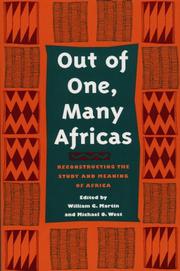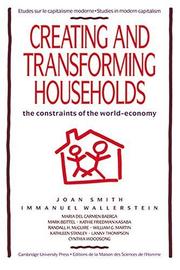| Listing 1 - 10 of 11 | << page >> |
Sort by
|
Book
ISBN: 1580467938 1580464319 Year: 2013 Publisher: Rochester, N.Y. : University of Rochester Press,
Abstract | Keywords | Export | Availability | Bookmark
 Loading...
Loading...Choose an application
- Reference Manager
- EndNote
- RefWorks (Direct export to RefWorks)
Once an international pariah, South Africa has emerged as a respected and influential African state, projecting its economic and political power across the continent. South Africa and the World-Economy: Remaking Race, State, and Region chronicles the volatile history of this resurgence, from the nation's rise as an industrialized, white state and subsequent decline as a newly under-developing country to its current standing as a leading member of the Global South. Contrasting with much of the latest scholarship, which examines South Africa as a discrete national case, this volume places the country in the global social system, analyzing its relationships with the colonial powers and white settlers of the early twentieth century, the costs of the neoliberal alliances with the North, and the more recent challenges from the East. This approach offers a bold reinterpretation of South Africa's developmental successes and failures over the last century -- as well as clear yet contentious lessons for the present. William G. Martin is Chair of the Department of Sociology at Binghamton University, coeditor of From Toussaint to Tupac: The Black International since the Age of Revolution, and coauthor of Making Waves: Worldwide Social Movements, 1760-2005.
Regional economic disparities. --- Differentiations, Regional economic --- Disparities, Regional economic --- Economic disparities, Regional --- Imbalances, Regional economic --- Unequal economic development --- Variations, Regional economic --- Economic zoning --- Regional disparities --- Regional economics --- Regional planning --- South Africa --- Africa, South --- Foreign economic relations. --- Economic policy. --- Economic conditions. --- Race relations --- Economic aspects. --- Disparidades económicas regionales --- Sudáfrica --- África del Sur --- África do Sul --- Afrika Selatan --- Afrique du Sud --- Azania (Country) --- Dél-Afrika --- Dél-Afrikai Köztársaság --- Derom Afriḳah --- Dorem-Afriḳe --- Güney Afrika --- Güney Afrika Cumhuriyeti --- I︠U︡.A.R. --- I︠U︡AR --- I︠U︡zhno-Afrikanskai︠a︡ Respublika --- I︠U︡zhno-Afrikanskiĭ Soi︠u︡z --- Janūb Ifrīqiyā --- Jihoafrická republika --- Juhoafrická republika --- Jumhūrīyat Janūb Ifrīqiyā --- Južná Afrika --- Južnoafrički savez --- Minami Afurika Kyōwakoku --- Nan Fei --- Nan Fei Gongheguo --- Nanfei --- Nanfei Gongheguo --- Repubblica del Sud Africa --- Republic of South Africa --- República da África do Sul --- República de Sudáfrica --- Republiek van Suid-Afrika --- Republik Südafrika --- Republik Suedafrika --- Republika Południowej Afryki --- République Sud Africaine --- RSA (Republic of South Africa) --- Sud África --- Südafrika --- Suid-Afrika --- Unie van Suid-Afrika --- Union of South Africa --- Южно-Африканская Республика --- جنوب إفريقيا --- جمهورية جنوب إفريقيا --- 南アフリカ共和国 --- 南非 --- 南非共和国 --- iRiphabhuliki yaseNingizimu Afrika --- iRiphabliki yomZantsi Afrika --- Repabliki ya Afrika-Borwa --- Rephaboliki ya Aforika Borwa --- Rephaboliki ya Afrika Borwa --- Riphabliki ya Afrika Dzonga --- iRiphabhulikhi yeNingizimu Afrika --- Riphabul̳iki ya Afurika Tshipembe --- iRiphabliki yeSewula Afrika --- Relaciones raciales --- Aspectos económicos. --- Condiciones económicas. --- Política económica. --- African state. --- South Africa. --- colonial powers. --- economic power. --- global politics. --- international pariah. --- neoliberal alliances. --- political power. --- postcolonial theory.
Book
ISBN: 9781580467933 9781580464314 Year: 2013 Publisher: Suffolk Boydell & Brewer
Abstract | Keywords | Export | Availability | Bookmark
 Loading...
Loading...Choose an application
- Reference Manager
- EndNote
- RefWorks (Direct export to RefWorks)
Book
Year: 2005 Publisher: Binghamton Fernand Braudel center
Abstract | Keywords | Export | Availability | Bookmark
 Loading...
Loading...Choose an application
- Reference Manager
- EndNote
- RefWorks (Direct export to RefWorks)
Article
Abstract | Keywords | Export | Availability | Bookmark
 Loading...
Loading...Choose an application
- Reference Manager
- EndNote
- RefWorks (Direct export to RefWorks)

ISBN: 0252067800 0252024710 9780252024719 9780252067808 Year: 1999 Publisher: Urbana University of Illinois Press
Abstract | Keywords | Export | Availability | Bookmark
 Loading...
Loading...Choose an application
- Reference Manager
- EndNote
- RefWorks (Direct export to RefWorks)
Even as symbols of Africa permeate Western culture in the 1990s, centers for the academic study of Africa suffer from a steady erosion of institutional support and intellectual legitimacy. Out of One, Many Africas assesses the rising tide of discontent that has destabilized the conceptions, institutions, and communities dedicated to African studies. In vibrant detail, contributors from Africa, Europe, and North America lay out the multiple, contending histories and perspectives that inform African studies. They assess the reaction against the white-dominated consensus that has marked African studies since its inception in the 1950s and note the emergence of alternative approaches, energized in part by feminist and cultural studies. They examine African scholars' struggle against paradigms that have justified and covered up colonialism, militarism, and underdevelopment. They also consider such issues as how to bring black scholars on the continent and in the diaspora closer together on questions of intellectual freedom, accountability, and the democratization of information and knowledge production.By surveying the present predicament and the current grassroots impulse toward reconsidering the meaning of the continent, Out of One, Many Africas gives shape and momentum to a crucial dialogue aimed at transforming the study of Africa (Provided by publisher)
Historiography --- #SBIB:39A3 --- #SBIB:39A73 --- #SBIB:93H1 --- Antropologie: geschiedenis, theorie, wetenschap (incl. grondleggers van de antropologie als wetenschap) --- Etnografie: Afrika --- Geschiedwetenschap. Hulpwetenschappen van de geschiedenis --- Africa --- Eastern Hemisphere --- Study and teaching (Higher) --- Historiography.
Book
ISBN: 9780807833094 0807833096 9780807859728 0807859729 Year: 2009 Publisher: Chapel Hill University of North Carolina press
Abstract | Keywords | Export | Availability | Bookmark
 Loading...
Loading...Choose an application
- Reference Manager
- EndNote
- RefWorks (Direct export to RefWorks)
African diaspora. --- Blacks --- Internationalism --- Black power --- Politics and government. --- History. --- Intellectual life. --- African diaspora --- #SBIB:316.7C160 --- #SBIB:39A4 --- #SBIB:93H3 --- Intellectual cooperation --- International cooperation --- Cosmopolitanism --- International education --- Nationalism --- Power, Black --- Black nationalism --- Black diaspora --- Diaspora, African --- Human geography --- Africans --- History --- Intellectual life --- Politics and government --- Cultuursociologie: contact tussen culturen --- Toegepaste antropologie --- Thematische geschiedenis --- Civil rights --- Migrations --- Black persons --- Negroes --- Ethnology --- Transatlantic slave trade
Book
ISBN: 1469605554 0807898724 9780807898727 9781469605555 9780807833094 0807833096 9780807859728 0807859729 9798893133349 Year: 2009 Publisher: Chapel Hill : University of North Carolina Press,
Abstract | Keywords | Export | Availability | Bookmark
 Loading...
Loading...Choose an application
- Reference Manager
- EndNote
- RefWorks (Direct export to RefWorks)
Transcending geographic and cultural lines, From Toussaint to Tupac is an ambitious collection of essays exploring black internationalism and its implications for a black consciousness. At its core, black internationalism is a struggle against oppression, whether manifested in slavery, colonialism, or racism. The ten essays in this volume offer a comprehensive overview of the global movements that define black internationalism, from its origins in the colonial period to the present.From Toussaint to Tupac focuses on three moments in global black history: the American and
Black power --- Blacks --- Internationalism --- African diaspora. --- Power, Black --- Black nationalism --- Intellectual cooperation --- International cooperation --- Cosmopolitanism --- International education --- Nationalism --- Black diaspora --- Diaspora, African --- Human geography --- Africans --- History. --- Intellectual life. --- Politics and government. --- Civil rights --- Migrations --- Black persons --- Negroes --- Ethnology --- Black people --- Transatlantic slave trade
Book
Year: 1990 Publisher: New York : Greenwood Press,
Abstract | Keywords | Export | Availability | Bookmark
 Loading...
Loading...Choose an application
- Reference Manager
- EndNote
- RefWorks (Direct export to RefWorks)
Economic history --- International economic relations --- Capitalism --- Competition, International --- Congresses. --- Developing countries --- Foreign economic relations


ISBN: 9780521427135 9780511520860 9780521415521 Year: 1992 Publisher: Cambridge Cambridge University Press
Abstract | Keywords | Export | Availability | Bookmark
 Loading...
Loading...Choose an application
- Reference Manager
- EndNote
- RefWorks (Direct export to RefWorks)
Digital

ISBN: 9781626371002 Year: 2022 Publisher: Boulder Lynne Rienner Publishers
Abstract | Keywords | Export | Availability | Bookmark
 Loading...
Loading...Choose an application
- Reference Manager
- EndNote
- RefWorks (Direct export to RefWorks)
| Listing 1 - 10 of 11 | << page >> |
Sort by
|

 Search
Search Feedback
Feedback About UniCat
About UniCat  Help
Help News
News